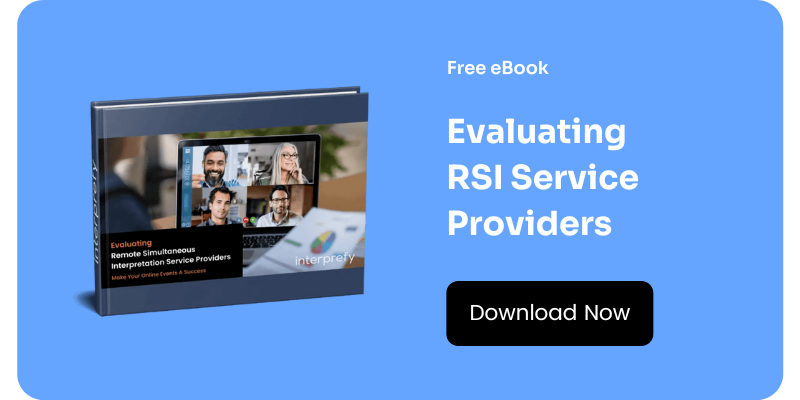In light of the challenges presented by COVID-19, more and more events are taking place online.
Thanks to modern technologies, it’s easier than ever for businesses to deliver meetings, conferences and seminars via the internet.
We’re already seeing a rapid shift to digital platforms: in April, Microsoft announced that all of its events will be “digital-only until July 2021” due to the coronavirus pandemic, while the likes of Apple, Facebook, IBM, Dell, Intel, SAP, Qualcomm and others, says Forbes, have “engaged in a quick pivot to create or participate in online events to connect with and serve their customers”.
But while the future of events is no doubt digital, “going online” isn’t as simple as downloading a solution, turning it on and inviting delegates to participate, especially for those that need to host large events in multiple languages.
For these businesses, the only real option is a online conference platform capable of delivering events at scale and to a multilingual audience.
You may be in this situation – but with so many different online conference platforms to choose from, what should you be looking for and how can you get the most out of the technology?
1. Check for remote interpretation capability
In the current climate, the only way businesses that host large online events for multilingual audiences can provide simultaneous interpreting is when the interpreters are connected remotely. This kind of technology enables interpreters to work from anywhere, and without the use of complicated, proprietary specialist equipment – they can just use a laptop with their microphone and headset.
With a virtual conference platform in place, there’s:
- No need to bring equipment onsite – events become much more resilient as if there’s a problem on-site (i.e. equipment stops working) or an interpreter is unable to travel (restrictions, pandemics like COVID-19), they have the option to work remotely.
- More flexibility – your events are no longer restricted to a single location. You can simply move your events online and enlist your usual interpreters to deliver their service remotely. Also, as your events are now online, more people can attend as they are no longer restricted by travel. You could even host hybrid or cluster events – part on-site, part online!
- Lower costs – you don’t need to pay for interpreters’ travel or accommodation, you just pay for their service. The money saved can then be spent on providing interpreting into more languages.
- Better quality You are no longer stuck with interpreters locally available, you can use the worldwide best interpreters, no matter where they live
However, please bear in mind that whilst a virtual conference platform might offer remote interpreting, does the provider of said solution have a network of specialised conference interpreters for you to choose from? Having the platform is just the first step, you still need experienced, highly qualified interpreters to deliver your content in the languages required.
2. Get as many languages as you can
When you take your events online you reduce and/or remove a few barriers to entry, namely: location, time and cost.
But what about language?
On-site events are limited in that there’s only so much space for interpreter booths, so often only the few most popular languages are chosen. Spiace, which perhaps could have used for more attendees. However, by taking events online you don’t have to worry about space and can enlist as many interpreters as you like. Furthermore, because your events are online, you now have access to a much, much larger audience.
The money you save on infrastructure can be used to acquire more conference-level interpreters, including for language interpreters for only a few delegates. Not only will this attract more people to your online events, it will also make them more inclusive as it shows you have considered everyone.
Our advice? Check to see if your online conference platform provider has a network of conference-level interpreters (as mentioned above) and services. They’ll be able to offer a discount as part of the package, and provide interpreters who are familiar with the platform you are using.
3. See if technical support and/or equipment is provided
Taking your events online requires so much more than just a platform – you need a provider that’s capable of helping you to configure it and manage it.
The right provider will be able to “onboard” you, that is explain how the solution works, implement it for you and – for a small additional fee – provide dedicated support before, during and after your events.
For example, will they:
- Train you and your team on how to use the platform?
- Offer dedicated support before, during and after the event?
- Help set up any equipment for interpreters? (Not so much providing the equipment itself but explaining how to get the best possible audio/video quality out of current devices)
- Record audio and/or video for use after the event, including for transcripts?
These are all relatively innocuous questions but they must be asked nonetheless. To make the most of your online conference platform, find a supplier that can help you with every aspect of it as this will make your life much, much easier!
4. Scrutinise qualifications and subject matter knowledge
So let’s say the provider you choose to work with has a network of conference-level interpreters and you want to enlist some of them for an upcoming event.
But how do you know if you’re getting the best value for your money?
As you’ve done the diligent work of setting up your online conference platform (and associated services), you need to make sure the interpreters on offer actually meet your requirements.
Some things to bear in mind as you evaluate the interpreters:
- Are they as skilled and knowledgeable as you need them to be?
For instance, can they demonstrate they understand the subjects that are going to be discussed at your event? Do they master the terminology? It would be pointless to enlist an interpreter that doesn’t understand the nuances of the content as they may convey the material in the wrong way. This is particularly important for highly technical subjects where difficult material often needs to be condensed and explained clearly to the audience.
- What are their qualifications and what level of experience do you need?
Any interpreter you choose should be qualified to a level where they are comfortable talking about the topics you plan to present. They should also have the appropriate level of experience so that they’re calm, composed and capable of delivering content in the right way. For example, an experienced interpreter will be able to deliver consistently under pressure, and will be able to cut fluff from content and focus on the most pertinent elements.
- Are they familiar with conferencing software/tools – i.e. your chosen platform?
Of the questions thus far, this is perhaps the most important. The biggest issues arise when an interpreter doesn’t know how to use the technology you have in place. This means you have to spend money to have them trained. Typically, a provider will be able to train interpreters on how to use their online conference platform. Also, if they have a network of interpreters it’s likely these interpreters will know how to use it already.
- Work with a provider that can help you every step of the way
At Interprefy, we specialise in providing remote simultaneous interpretation (RSI) for multilingual on-site and online events. We provide the world’s leading cloud-based RSI platform (or virtual conference/online events platform). It enables interpreters to work from anywhere, anytime, and without specialised equipment, it’s easy to set up and use, and it’s scalable and flexible (making it suitable for any event).
If you need specific languages, our language service provider (LSP) network can source the best conference-level interpreters for you so you can focus on making your event great. We’ll even provide technical support and expertise to ensure your events go ahead smoothly.
We’re with you every step of the way, so if you’re really looking for help taking your events online – why not talk to us?
For more information on online events and evaluating RSI providers, you should download our free eBook below!






 More download links
More download links



